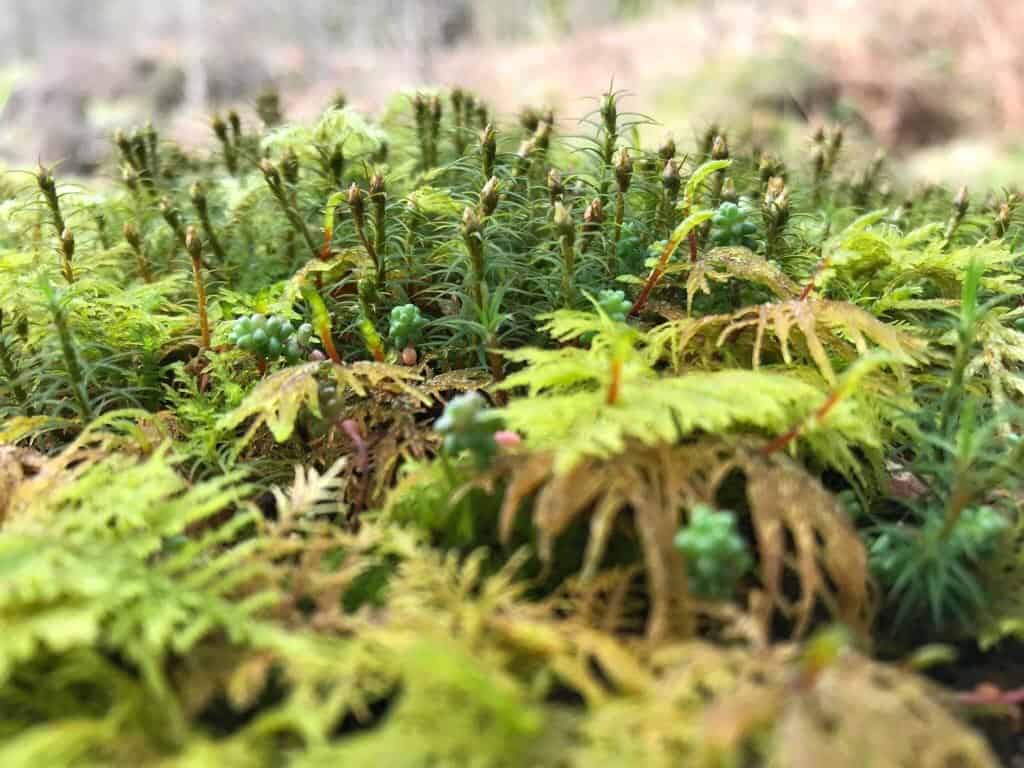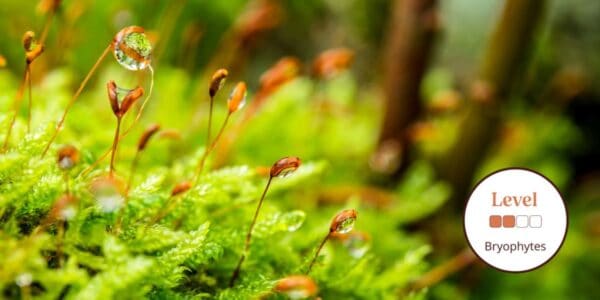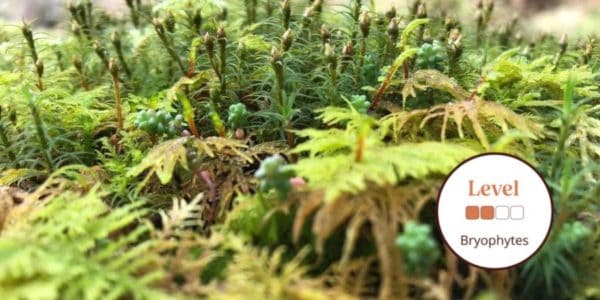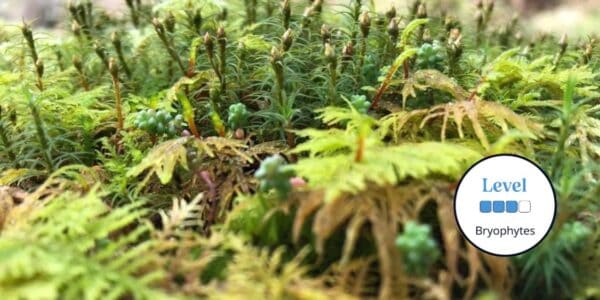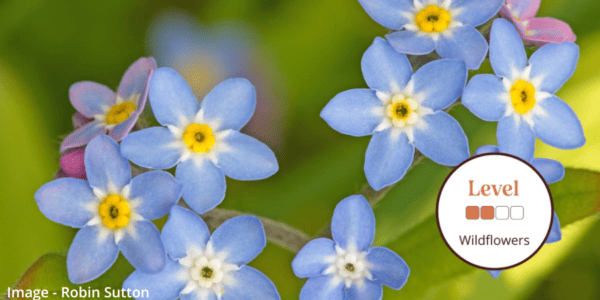This introductory bryophytes course is a great place to start for those taking their first steps into the world of mosses, liverworts and hornworts.
Have you ever wondered what makes up the bright green carpets on rocks and trees? If you take a closer look, a diverse and prehistoric world is revealed. With over half of all European moss, liverwort and hornwort species present in the UK, there is so much to explore!
During this course, will gain a better understanding of this diverse group, all under the guidance of an engaging and knowledgeable expert in the field. You will learn about their biology and ecology and have ample time to explore your surrounding environment to find some specimens, learning valuable observational field identification tips. Mosses are a comparatively neglected group but they have much to offer, being at their best in winter and are sensitive to soil and habitat conditions.
This course takes place in a stunning 18th-century country house situated within the North Downs just next to Box Hill in the beautiful Surrey countryside.
PLEASE NOTE: The course fee is for tuition only. There is no accommodation provided with this course. You can search for options locally should accommodation be required.
If we are unable reach viable numbers for this course, we will inform you of the course cancellation 14 days prior to the course run. We would recommend when purchasing accommodation and/or travel you should take out your own insurance.
Bookings will close if course capacity is reached.
If you’re interested in finding out more about mosses, liverworts and hornworts but don’t feel quite ready for a specific field ID course, then this is the course for you!
Who Should Attend?
Nature enthusiasts, Students, Rangers, Early career consultants and ecologists.
Knowledge Level
Introductory. Level descriptors can be found on the following webpage:Framework and Course Level Descriptors
Prior Knowledge
No existing knowledge, or experience is needed for this course. Just a willingness to explore and learn.
What will be covered during this course?
-
- An introduction to bryophyte biology
- An introduction to bryophyte ecology
- An overview of the species diversity within the UKPlease note that this course is NOT a species identification course
By the end of the course, you will be able to:
-
- Describe which groups of organisms are classified as bryophytes and what makes them different from all other plants
- Understand the basics of bryophyte lifecycles and reproductive strategies and structures
- Describe bryophyte habitats and their environmental conditions
- Recognise groups of common bryophytes in their natural environments
- Share this knowledge with friends, family, and fellow volunteers.
This is a place-based training course from the Field Studies Council, including a balance of classroom-led learning to impart important knowledge and irreplaceable hands-on outdoor learning opportunities to give individuals skills and confidence. After attending this course, you may like to progress your learning with further relevant courses or branch out into other areas of natural history. The Field Studies Council offers both online and in person courses, so you can choose the learning style that suits you best.
The course gives you the opportunity to immerse yourself in a new subject and acquire novel skills. Our fantastic tutor will combine the use of classroom-led learning and outside learning opportunities to give individuals the skills and confidence to progress their learning.
-
- See the ‘Example Timetable’ and ‘What’s Included’ sections below for more information about this course.
- Upon booking you will need to provide individual details of all attendees
- Please email [email protected] if you have any questions.
Group Bookings Made Easy
If you have a group of 10 or more individuals wanting to complete one of our courses, our team are available to discuss your options – from discounts to private team courses.
- Discounted rates
- Privately run courses for your group
- Bespoke courses developed specifically for your needs
If we are unable to reach viable numbers for this course, we will inform you of the course cancellation 14 days prior to the course run. We would recommend when purchasing accommodation and/or travel you should take out your own insurance.
Tutor: June Chatfield
Dr June Chatfield has had a lifelong interest in snails and is a Vice President of the Conchological Society of Great Britain and Ireland with a career as a college lecturer, museum curator, author and consultant. She has led snail courses at Juniper Hall since 1967. Dr June Chatfield has been made an OBE for services to conservation and natural history education.Book with Confidence
We understand the difficulties of making plans in the current situation when guidelines continue to change, and insurance conditions are being tightened. In response, we will continue to offer additional flexibility. Find out more here
Example Timetable
Example Timetable
This timetable is subject to change but should give a clear outline of what to expect
-
- Please arrive in time for the course to start promptly at 10:00am
- The course will end at 5:00pm
Day 1
| 10:00am | Introductions |
| 10:15am | Classroom session covering:
|
| 11:00am | Break and prepare for field session – refreshments not provided |
| 11:15am | Guided walk around the centre |
| 12:30pm | Lunch – Not included |
| 1:30pm | Practical identification and use of key from material collected |
| 3:00pm | Break – refreshments not provided |
| 3:15pm | Assemble spreadsheet of finds and discuss ecology Further work in the lab with microscopes |
| 4:30pm | Classroom plenary and final questions |
| 5:00pm | Finish |
Please note accommodation and an evening meal is not included
What's Included
The course has been carefully created by expert tutors and educators to help you continue to build and develop your knowledge and apply it within the field surrounded by like-minded individuals.
The course includes:
- Classroom learning covering the theory of the species
- Field excursions to apply new knowledge
- Expert tuition for which the Field Studies Council is renowned
- Clear objectives and progression
You can rest assured that the absolute best content from an expert in environmental education will be provided. In choosing a Field Studies Council course, you will be joining thousands of people who learn with us each year.
Reviews
-
★★★★★
Excellent (the tutor) was very helpful and provided the guidance needed when starting this area of study.
-
★★★★★
Very skilled tutor who is an excellent teacher
Before You Attend
Before you attend:
- Notebook and pencil
- Camera to capture images
- Please bring your own refreshments & pack lunch
- Sensible footwear and clothing for being outdoors
- Hand lens (if you have one)
There will be a member of staff with first aid training and access to a first aid kit on site. If you have special medical or access requirements, please let us know as soon as possible so we can plan the course.
Sorry this course booking is closed

